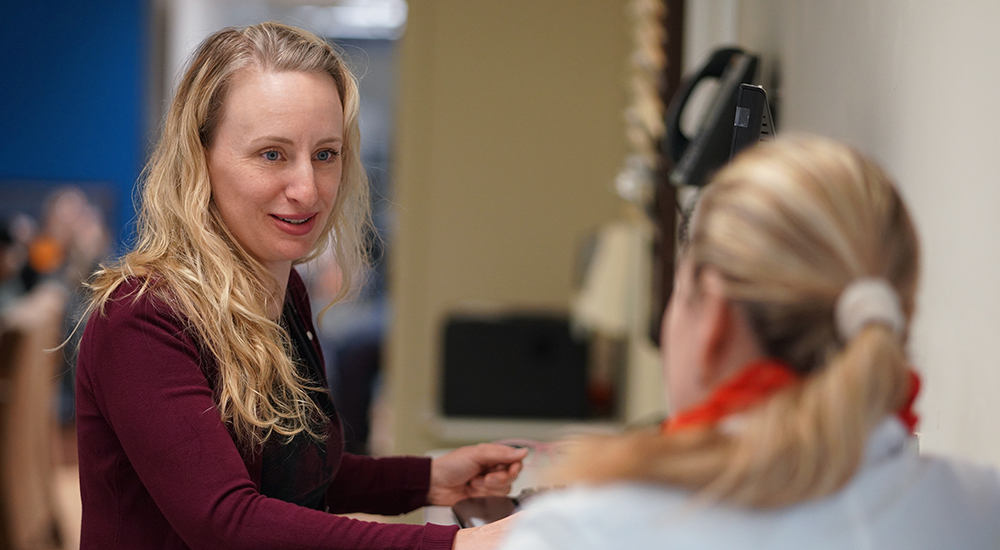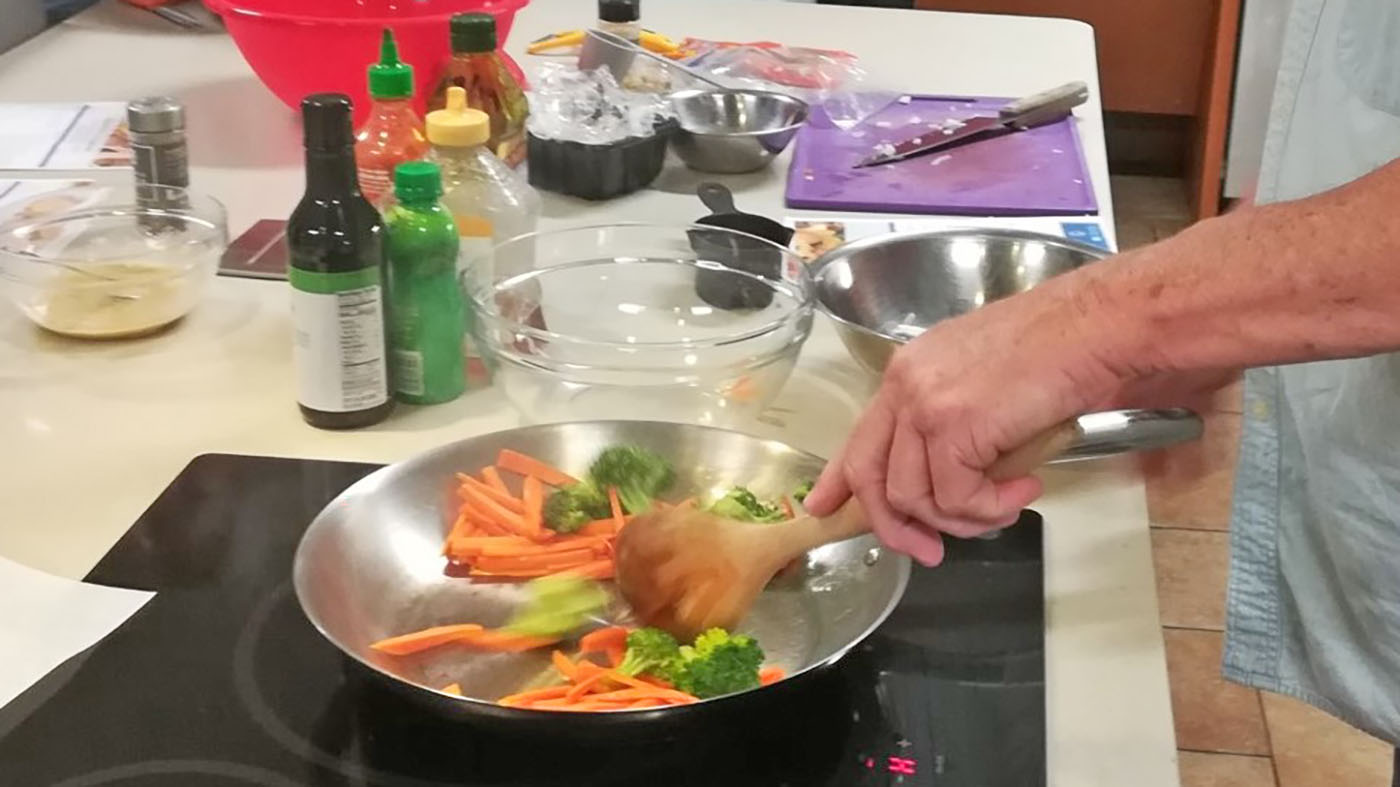March is Women’s History Month. Here’s just one of the thousands of remarkable women taking care of Veterans for VA.
When Ileana Howard (pictured above) was a trainee at the University of Washington, she didn’t know that caring for Veterans would become her life’s work.
When she was assigned to the VA Puget Sound Health Care System in the winter of 2005, it turned out to be a moment of clarity for her.
She enjoyed working with people more than test tubes.
“When your work is providing health care for Veterans, you don’t just have a job, you’ve been entrusted with a very important mission,” said Howard, the outpatient medical director for Rehabilitation Care Services (RCS) at VA Puget Sound and a clinical associate professor of rehabilitation medicine at the University of Washington School of Medicine.
“It’s incredible to be surrounded by coworkers who feel the same way,” said Howard.
As a young girl, Howard remembers being drawn to science. But she enjoyed working with people more than test tubes and found herself fascinated by the rehabilitative process once she entered medical school.
The focus of RCS is helping Veterans recover from neurological and musculoskeletal injuries to achieve their highest level of function and quality of life. It’s an area of care that presents challenges, but also an inspiration.
Inspired by Veterans’ heroism and self-sacrifice
“I am inspired by my Veterans not only for the heroism of their past accomplishments but for the dignity, grace, and self-sacrifice with which they often meet some of life’s most challenging health conditions,” said Howard.
Some of Howard’s most lasting contributions have come from working with Amyotrophic Lateral Sclerosis (ALS) patients. VA Puget Sound has been steadily growing its ALS treatment capability since 2013 when it partnered with the ALS Association Evergreen Chapter and Paralyzed Veterans of America to better serve Veterans with ALS and their families. Howard spearheaded this effort, and the next year, her team opened a clinic at VA Puget Sound’s American Lake campus in addition to the existing clinic in Seattle.
In 2018, she was awarded the Paralyzed Veterans of America Clinical Excellence Award for her work with the ALS program. Her innovations are also spreading across the nation. Clinics affiliated with Yale University, Duke University, Cleveland VA Medical Center and Atlanta VA Health Care System are now equipped with tools Howard’s team developed to enhance the quality of ALS patient care in the Pacific Northwest.
“Our ALS team guides Veterans living with ALS and their families throughout the journey and assists them in maximizing the various VA benefits that are available,” said Howard. “Our rehabilitative services are second to none, and we are very grateful for the benefits available to support these families. These include coordinated medical care, durable medical equipment, funding for home modifications, assistive technology, and services to aid in activities of daily living.”
Training next generation of rehabilitation physicians
Howard has shepherded the ALS rehabilitative care team through a series of certifications to demonstrate to her patients that VA care is as good or better than that available in the community. These acknowledgments have also better positioned the team as experts in service to rehabilitation teams caring for Veterans across the country.
Howard’s career has come full circle—now she trains the next generation of rehabilitation physicians throughout VA Puget Sound. Several of her students are already staff rehabilitation physicians at VA hospitals around the nation. She thinks it’s important for students to have the experience of serving, regardless of their ultimate career path.
A native of Federal Way, Wash., Howard is especially passionate about ensuring access to care for Veterans in the South Sound region. She attended school in Tacoma and is very grateful for the medical care her grandfather, a U.S. Army Veteran, received at the end of his life through the VA.
Providing virtual “house calls” with telehealth
Telehealth is one of the tools Howard uses to meet the health care needs of Veterans like her grandfather.
“It’s an incredible tool that allows us to provide the highest level of specialty care for our most disabled Veterans regardless of where they are located,” she said. “I’ve provided ‘house calls’ to Veterans in Eastern Montana as well as all the way to Alaska.
“Leaving their home is a huge challenge for these patients, so it’s a big relief when we can bring our services to them, even virtually,” she added.
Working alongside her team, Howard is a natural optimist who loves her work and appreciates the opportunity to serve Veterans.
“Providing rehabilitation services to our nation’s heroes is the most rewarding job I can imagine,” said Howard. “On a daily basis, we dispense both healthcare and hope.”
About the author: Jeremy Croft is with the VA Puget Sound Health Care System Public Affairs Office
Topics in this story
More Stories
VA promotes early nutrition intervention for chronic kidney disease with targeted programs like Heathier Kidneys Through Your Kitchen.
VA Research Advisory Committee on Gulf War Veterans’ Illnesses hosting Veteran Engagement Sessions in Phoenix for 1990-91 Gulf War Veterans.
Navy Veteran and president of the American Medical Association got a colonoscopy and encourages other Veterans to do the same.








I’m a new wife to a. Veteran. So I’m new to the crazy way the VAsystem works. As an outsider its as if the VA SYSTEM is putting health issues of our veterans an the back burner in hopes they will die before having to treat them. This is not acceptable. I’m glad. Her father was treated so well , but why wait till your on death’s bed.
My husband has tried to be seen for this tumor he has growing rapidly on his brain and thru his skull. The pain has just been unbeArable at times, the only relief for the constant pain is sleep.
Finally waiting for neurolgy to make appt which could be another 30 says or more. Truthfully I don’t think he will live to see that appointment. I watch him deteriate more every day. He has lost over 35#s in 30 days. He can hardly walk steady, eats very little. It even hurts him to think.
I don’t know what I expect you to do. I’m just desperate to get him the care he deserves.
If nothing else please pray for my husband, pray for change in the system.
Thank you,
Georgia Jump
My husband is:
Edward Bruce Jump